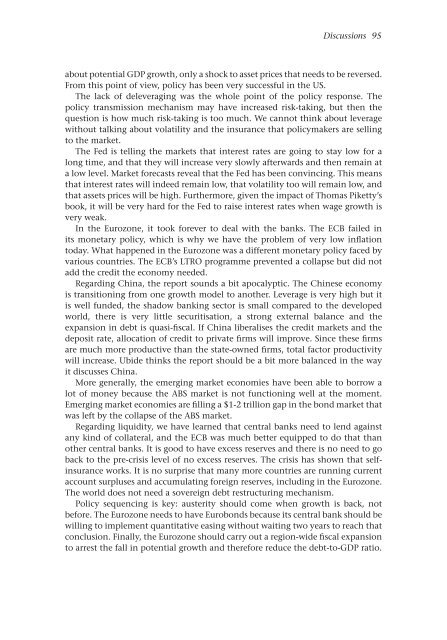1qGLG9p
1qGLG9p
1qGLG9p
You also want an ePaper? Increase the reach of your titles
YUMPU automatically turns print PDFs into web optimized ePapers that Google loves.
Discussions 95<br />
about potential GDP growth, only a shock to asset prices that needs to be reversed.<br />
From this point of view, policy has been very successful in the US.<br />
The lack of deleveraging was the whole point of the policy response. The<br />
policy transmission mechanism may have increased risk-taking, but then the<br />
question is how much risk-taking is too much. We cannot think about leverage<br />
without talking about volatility and the insurance that policymakers are selling<br />
to the market.<br />
The Fed is telling the markets that interest rates are going to stay low for a<br />
long time, and that they will increase very slowly afterwards and then remain at<br />
a low level. Market forecasts reveal that the Fed has been convincing. This means<br />
that interest rates will indeed remain low, that volatility too will remain low, and<br />
that assets prices will be high. Furthermore, given the impact of Thomas Piketty’s<br />
book, it will be very hard for the Fed to raise interest rates when wage growth is<br />
very weak.<br />
In the Eurozone, it took forever to deal with the banks. The ECB failed in<br />
its monetary policy, which is why we have the problem of very low inflation<br />
today. What happened in the Eurozone was a different monetary policy faced by<br />
various countries. The ECB’s LTRO programme prevented a collapse but did not<br />
add the credit the economy needed.<br />
Regarding China, the report sounds a bit apocalyptic. The Chinese economy<br />
is transitioning from one growth model to another. Leverage is very high but it<br />
is well funded, the shadow banking sector is small compared to the developed<br />
world, there is very little securitisation, a strong external balance and the<br />
expansion in debt is quasi-fiscal. If China liberalises the credit markets and the<br />
deposit rate, allocation of credit to private firms will improve. Since these firms<br />
are much more productive than the state-owned firms, total factor productivity<br />
will increase. Ubide thinks the report should be a bit more balanced in the way<br />
it discusses China.<br />
More generally, the emerging market economies have been able to borrow a<br />
lot of money because the ABS market is not functioning well at the moment.<br />
Emerging market economies are filling a $1-2 trillion gap in the bond market that<br />
was left by the collapse of the ABS market.<br />
Regarding liquidity, we have learned that central banks need to lend against<br />
any kind of collateral, and the ECB was much better equipped to do that than<br />
other central banks. It is good to have excess reserves and there is no need to go<br />
back to the pre-crisis level of no excess reserves. The crisis has shown that selfinsurance<br />
works. It is no surprise that many more countries are running current<br />
account surpluses and accumulating foreign reserves, including in the Eurozone.<br />
The world does not need a sovereign debt restructuring mechanism.<br />
Policy sequencing is key: austerity should come when growth is back, not<br />
before. The Eurozone needs to have Eurobonds because its central bank should be<br />
willing to implement quantitative easing without waiting two years to reach that<br />
conclusion. Finally, the Eurozone should carry out a region-wide fiscal expansion<br />
to arrest the fall in potential growth and therefore reduce the debt-to-GDP ratio.


